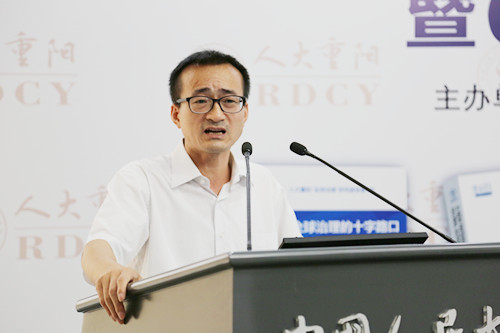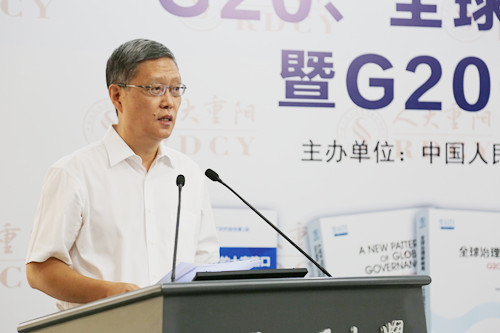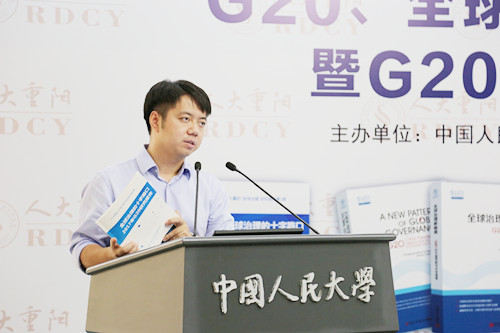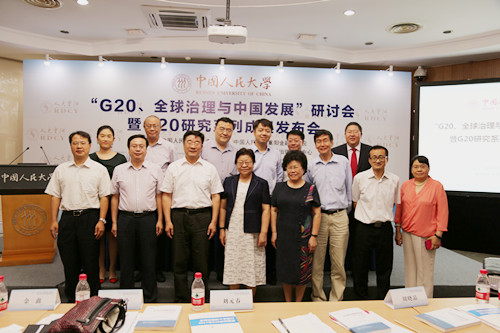Picture
Your Present Location: HOME> PictureThink Tank Report: G20 faces the risk to be “diluted” and “mediocritized”
G20 Leaders Summit held in Hamburg, Germany on July 7 and 8, 2017. In order to prepare for G20 summit, in the afternoon of July 2nd, "G20, Global Governance and China Development" seminar and the release of achievements of G20 research was successfully held by Chongyang Institute for Financial Studies, Renmin University of China (RDCY) and Global Governance Research Center, Renmin University of China (GGRC) at the Shaw Conference Center, Renmin University of China (RUC). Nearly 200 experts, scholars and media attended.
Liu Yuanchun, Vice President of RUC, Executive Director of RDCY, co-chairman of the GGRC; He Yafei, Former Vice Foreign Minister, Senior Fellow of RDCY and Director of GGRC delivered keynote speeches. Liu Wei, President of RUC, made a closing remark.
Liu Yuanchun said, “black swan” events occurred frequently in recent years, one sign is the mistakes made by the elite class, another is the social disorder. First of all, we are in a transition era of the world economic cycle and super hegemony cycle, there will be a large adjustment of governance system and the reconstruction of superstructure, but the new governance system can not emerge between the two cycles. Secondly, in the process of reorganization of the world system, global technology, population dividend, income distribution and so on went into the recession period, the financial crisis in 2008 triggered reflections on "Long-term Stagnation Theory". The original distribution system is polarized, and now the actual situation is "the collapse of the middle class", and the traditional elite class’ interests are harmed by globalization. So when the global dividend declines rapidly, the governance system themed the “win-win model” is also in a rapid collapse. Finally, the world is currently entering conversion period of large cycle, some variation also took place in G20, under the "America first" concept, freedom may be replaced by fairness; inclusive growth may be replaced by regulation-based growth, which is worthy of our vigilance.

Liu Yuanchun, Vice President of RUC, Executive Director of RDCY
He Yafei said, firstly G20 needs the "innovation and development, coordination and tolerance" spirit, continue to promote the steady growth of world economy in the "new normal". Among them, innovation is the core, macro policy coordination is a necessary condition; secondly, G20 needs the great powers to unite and cooperate with each other to jointly deal with the global challenges, transcend the geopolitical struggle and choose peaceful cooperation. "Only cooperation is the right option"; thirdly, G20 needs to build "global consciousness", overcome the narrow concept of "national interests first" or "oneself first", and strive to reverse the "deglobalization" trend and the negative energy of populism; fourth, G20 needs to pay more attention to development issues, fundamentally solve the world economic development imbalance. Emphasis on development issues, highlighting the development agenda, and developing the framework for promoting development and correcting the imbalances in world economy in context of the United Nations 2030 sustainable development goals should continue to be the main objectives of G20 summit.

He Yafei delivers speech at the forum.
In his closing remark, President Liu Wei pointed out: First, let G20 become a "shock absorber" for global risks. The global economic risks continue to accumulate, we need to strengthen cooperation through the G20 mechanism with a more open attitude to solve the world economic foci, continue to deepen the consensus of identification and supervision of systematic non-bank financial institutions, strengthen the cooperation in cross-border capital flow supervision, and gradually achieve the traceability of supervision, and prevent abnormal capital flows. We should cooperate in coordination and synergy to solve the problem of global development imbalance. Second, let G20 become the "power source" of the world`s sustainable development. We can built the world`s innovation system under the G20 mechanism to promote global economic governance cooperation in many ways. We should strengthen the cooperation of Research&Development capability and the capability of commercialization of research results. We should strengthen interactions between the main players of innovation, innovative power, innovative product sales market and a variety of different parts to inject new growth momentum to the world economy. Third, let G20 become the "hub" of global governance system. Under the G20 mechanism, it is possible to push forward the cooperation between G20 and China`s "Belt and Road" initiative, providing a broader perspective and strong driving force for the G20 process on global scale so that G20 can become the "hub" of the global governance system.
Professor Wang Wen, Executive Dean of RDCY, Executive Director of GGRC, also the moderator of the meeting, released the "Crossroads of Global Governance: G20 Research Report of 2017" and related G20 achievements. This report is a collection of the results of the G20 think tank research field, combined with new situation and new problems in global governance in 2017. The report is the latest research report completed with full support of the entire research team. It is also composed of four major parts: turning point and potential risks of G20, the potential risks and policy recommendations of the G20 Hamburg Summit in 2017, the upgraded Chinese elements of G20 and the future of G20. The report comprehensively expounded as the premier forum for international economic cooperation whether can G20 continue to lead the world economy to a strong, sustainable and balanced growth in the post-Hangzhou era, and whether the "China solution" will continue to have a deep impact on the G20 and global governance and put forward policy recommendations for the future development of G20 from the perspective of think-tank.

Wang Wen, Executive Dean of RDCY
The report first pointed out that the year of 2017 is the turning point of G20, mainly in five aspects: the year for achieving overall economic growth target; the year for transforming from crisis response mechanism to long-term governance mechanism; the year of intensified world political and economic uncertainty; the year when globalization and global governance are faced with intensified "disorder" and "fragmentation"; the year when the extension and focus of G20 theme are faced with diversification.
Then, the report focused on the risk outlook and policy recommendations for G20 Hamburg Summit, and pointed out that the theme of G20 Hamburg Summit - "Shaping an Interconnected World" partly inherited the Hangzhou Summit’s theme - "Building an Innovative, Invigorated, Interconnected and Inclusive World Economy" and its spirit of connected development and inclusive growth. But there are many aspects that should be closely observed by the Chinese side, mainly in three aspects: First, the sustainability and focus of Hamburg Summit’s core issues are far from China’s expectations. For example, the Hangzhou Summit stressed the importance of innovation and developed innovation initiatives and other plans, but in the Hamburg Summit, related issues do not cover too much about innovation and the new industrial revolution; issues of Hangzhou summit, such as "strong international trade and investment", " to promote inclusive and interlinked development", “the connectivity of infrastructure” are overshadowed by issues such as refugee issues, counter terrorism financing, climate change and public health, which are of greater concern to the host country. Second, Hamburg Summit conference framework is difficult to maintain the continuity and synergy of Hangzhou Summit, in addition to the conventional G20 Leaders Summit, coordinator channels, financial channels, relevant professional ministers meeting, working group meetings, supporting activities in the preparation process have been changed and adjusted. Third, the outcome of the Hamburg Summit could hardly surmount that of the Hangzhou Summit.
To this end, the report also predicted that the G20 Hamburg Summit will face several possibilities: First, the Summit result may be "mediocritized". Second, the multilateral coordinated governance may be "diluted". Third, the secondary dialogue maybe "crossed" with the global mechanism. Fourth, accidental events may be "focused".

When it comes to the "Chinese value" and "Chinese experience", the report recommends that G20 should adopt China`s "five-year plan" program. Because China`s "five-year plan" is the world`s sustainable growth strategy, lasting for 60 years. China`s development achievements to a large extent depends on the past decades of consistent "five-year plans".
At the same time, the report also highlighted the relationship between G20 and the “Belt and Road Initiative”. Both are different in form and content, but there are many things similar in ideas and goals. The “Belt and Road” Initiative advocates the construction of an open world economy, the implementation of the 2030 sustainable development agenda, to solve the problem of global development imbalance, just like the commitment of G20 to strengthening the global economic governance. Therefore, G20 is the best mechanism to coordinate and organize the “Belt and Road” Initiative.
Finally, in the policy recommendations section, the report states: first, lower expectations. Various countries should unite the host country of Germany, and have a long-term and big picture view. As the former host country, China need to lower expectations, and make a choice of the result documents, such as 2030 sustainable development agenda, inclusive growth, etc. which should always be embedded into the future G20 agenda. Local and temporary issues could be properly put aside. Second, adjust the risk prevention of US policy, and take the initiative to shape the global understanding of Trump. In the long run, China and the United States should continue to maintain the relationship of harmony in diversity, when game and cooperation will coexist. We need to let Trump adapt to cooperation with China, take the initiative to shape his global understanding and enhance China’s active risk prevention. Third, deepen the comprehensive strategic partnership with Germany and the European Union, and build more consensus between China and EU. The high level and maturity of the development of China-EU relations will help the docking of their respective development strategies, especially the "Belt and Road initiative" and the European investment plan. Fourth, better play the role of “China+” mechanism such as “China+BRICS”, “China+EU”, and actively seek cooperation and mutual benefit, so that China can strengthen bilateral and multilateral dialogue, play a leading role in bigger scale, and lead the new global governance landscape. Fifth, take the opportunity to promote the China’s global governance experience, make innovation in global public goods to improve governance deficits. The “Belt and Road Initiative”, the establishment of AIIB and the BRICS New Development Bank effectively complement the public goods of global governance, improve the global governance deficit, but also help to strengthen China`s leadership. Sixth, strengthen the capacity of non-governmental power to transform consensus to actions and enhance the international speaking right of China. In addition to the official diplomacy at the government level, we should also exert China’s influence in the international organizations, business, youth, women, think tanks and other aspects so as to enhance China`s participation and coordination, and make "China`s value" gradually recognized and accepted.
After the conference, a number of experts had an in-depth discussion around the topics of "Hangzhou to Hamburg: G20 and China’s Development" and "Global Governance and the Role of China`s Think Tank". The attendees are: Zhang Yanling, Former Vice governor of Bank of China, Executive Director of ICC, Senior Fellow of RDCY, Director of Academic Committee of GGRC; Jin Xin, Director of the China Center for Contemporary World Studies of the International Liaison Department of the Central Committee of the CPC, Secretary-general of the Council of the Belt and Road International Think Tank Cooperation Alliance; Bai Ming, Deputy Director of the International Market Research Institute of the Ministry of Commerce; Wang Yong, Professor at Peking University`s School of International Relations, Director of the International Center for Political and Economic Research, Peking University, the Chinese Foreign Ministry School professor; Zhou Xiaojing, Former Researcher of Development Research Center of State Council (DRC), and Director of Asia-Africa Development Research Institute, in affiliation with the DRC; He Weiwen, Former Economic and Commercial Counselor of China’s Consulate to San Francisco and New York, Senior Fellow of RDCY; Chen Wenling, CCIEE Chief Economist; Bi Jiyao, Deputy Director of the Institute for International Economic Research under the NDRC; Liu Zhiqin, Senior Fellow of RDCY, Academic Committee Member of Global Governance Research Center. Jia Jinjing, Director of the Macro Research Department, and Chief Researcher of RDCY and Yang Qingqing, Director of Research Cooperation Department and Director Assistant of GGRC respectively hosted the two panels.
With the G20 Hamburg Summit approaching, Chinese think tanks should actively refelct upon global governance and China’s plan, play a good role of "tank of thoughts" for G20. RDCY has held four consecutive G20 think tank forums (T20) since 2013 and has been designated by the Chinese government as the leading think tank of the G20 Think Tank Summit(T20) in 2016, and has organized 10 think tank activities with a series of institutions in 10 cities around the world; RDCY has published nearly 20 books and reports related to the G20. The research results have earned important instructions of the party and state leaders. RDCY has trained and created a number of G20 research teams of experts well-known both at home and abroad, and built a global collaborative network of G20 research think tanks. RDCY has deeply taken participation in the G20 process, and accumulated a lot of research materials and gained the wisdom and experience communicating with international think tanks. To this end, in March 2017 RDCY has also received donation to set up and manage the Global Governance Research Center. RDCY will also hold a "global governance" forum of grand scale in the second half of this year.
Key Words: G20;Global Governance;RDCY























































































 京公网安备 11010802037854号
京公网安备 11010802037854号





